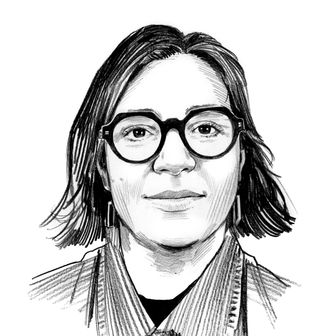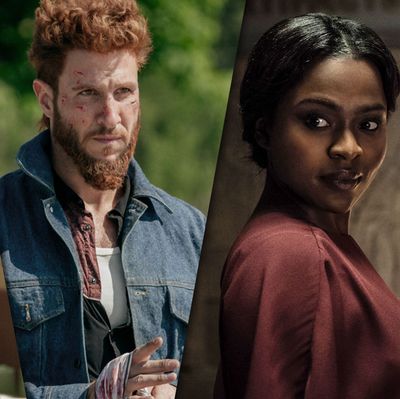
Spoilers ahead for American Gods.
If you plan to watch American Gods without first reading the Neil Gaiman book that it’s based on, you’re probably going to have a lot of questions. Like: Why does the show open with Vikings coming to America in the year 813 C.E.? Why do the Vikings, shortly after arriving in here, begin stabbing out their own eyeballs? Why does the story proceed directly from the Viking scene to a cell in a modern-day prison?
By the time you watch the exchange where the protagonist, Shadow Moon, is sitting in a limo opposite a young man whose face keeps dissolving into a jumble of pixels, you will inevitably find yourself asking, as Shadow Moon does in about so many words, what the hell is going on?
As one of many, many Neil Gaiman fans whose devotion to the master borders on, well, the religious, I’m here to provide some answers.
At the heart of the story is a fairly simple premise. When people come to America from other countries, as the Vikings do in the show’s opening prologue, they bring their gods with them. Eventually, their descendants assimilate into American culture, and the old gods are mostly forgotten. Yet the gods carry on, running funeral parlors or video stores or driving cabs. Like regular folks, they need to eat and make the rent. But they also need to be revered. When people stop worshipping them completely, they wither away.
Below, you’ll find a handy guide to all the gods we’ve met so far.
God name: Thoth
Character name: Ibis
Played by: Demore Barnes
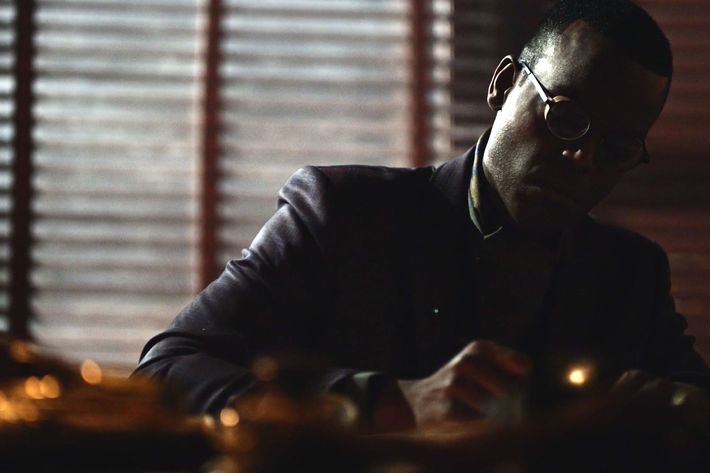
The first god we see is Ibis, also known as Thoth. In the mythology of ancient Egypt, he was the scribe of the gods. In most traditional depictions he has the head of an ibis bird, with a long curved beak. This Ibis has a human head and round, rimless glasses. He looks a little like Henry Louis Gates Jr., and like the famous professor, he’s interested in people’s roots. When the show opens, he’s writing a history of his pal Odin, the all-father of Norse mythology, god of war, wisdom, and poetry, among other things.
God name: Odin
Character name: Mr. Wednesday
Played by: Ian McShane
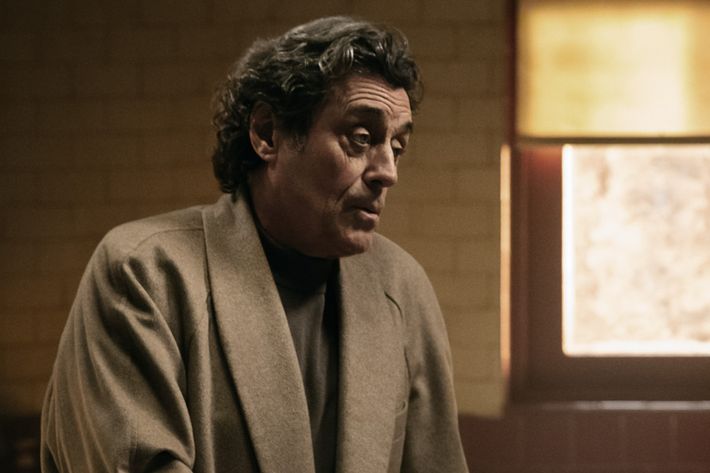
How did Odin arrive in America? According to Ibis, Odin’s American adventure began when his Viking followers sailed from their home in Scandinavia to a rocky beach within the borders of what will one day be considered part of America. When the wind dies down and the Vikings find themselves stranded, they decide to appeal to the Viking Supreme. Concerned they won’t get Odin’s attention so far away from home, they stab out their own left eyes. This might seem like a pretty rash and absurd way to get someone’s attention, even a war god’s, but you have to understand — according to legend, Odin sacrificed his own left eye in exchange for a drink from the Well of Wisdom. These guys grew up learning that if you want something desperately, taking a knife to your eyeball can be a productive solution. Look, they’re Vikings. Rational thinking isn’t one of their strong suits. In any case, it doesn’t work, so they try something even rasher. Odin is a war god, so maybe some war will make him happy, right? They start killing each other, and apparently it does the trick. The wind comes back and they sail home. Odin, though, hangs around.
When we meet Odin, played by Ian McShane, it’s the god, not the Vikings, who has seemingly fallen on hard times. He’s a doddering old man at the airport, pleading with a girl at a ticket counter to replace a first-class ticket he claims to have lost. Now he goes by Mr. Wednesday (the Danish, Norwegian, and Swedish word for Wednesday is Onsdag, which means ‘Odin’s day). And as it turns out, he isn’t nearly as helpless as he seems at first, though he is definitely very old. Odin, it seems, has taken up a quintessentially American occupation: He’s a con man. The job pays okay, but more important, it satisfies that other need that all gods share. “It’s all about getting people to believe in you,” he explains to Shadow, once they are comfortably seated side by side in first class. “It’s not the cash, it’s the faith.”
God name: Queen of Sheba
Character name: Bilquis
Played by: Yetide Badaki
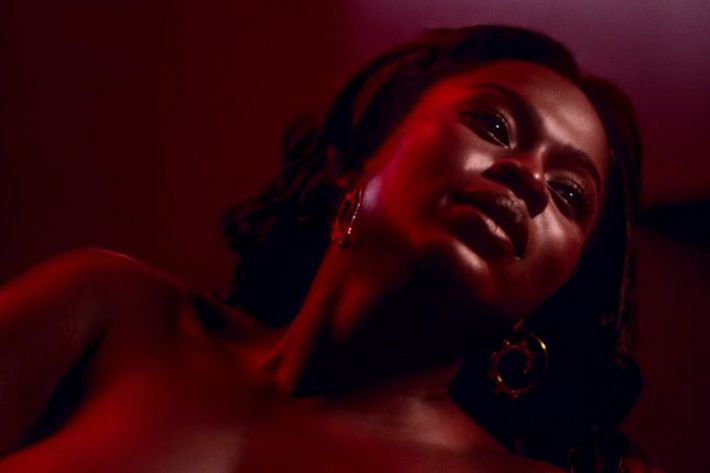
All the old gods we meet are hustling for faith. Take Bilquis, the woman in red whom we meet in another of Ibis’s chapters on the forsaken gods and goddesses. She’s what’s left in America of the Queen of Sheba, not technically a goddess (Gaiman describes her in the book as a half-demon), but nonetheless worshipped for her beauty and power. In the book, she’s a prostitute, but here, she’s on an internet date gone horribly wrong. Or totally right, depending on if you take her perspective or the unfortunate date’s. In brief, they go back to her room, which is the color of raw liver, and have sex. Innocently, she asks him to light a red candle; once inside her, she asks him to worship her. He obliges, and for his trouble, ends up disappearing inside her, like a reverse birth. Satisfied, she admires herself in the mirror, her skin smooth and youthful once more.
God name: Loki
Character name: Low Key Lyesmith
Played by: Jonathan Tucker
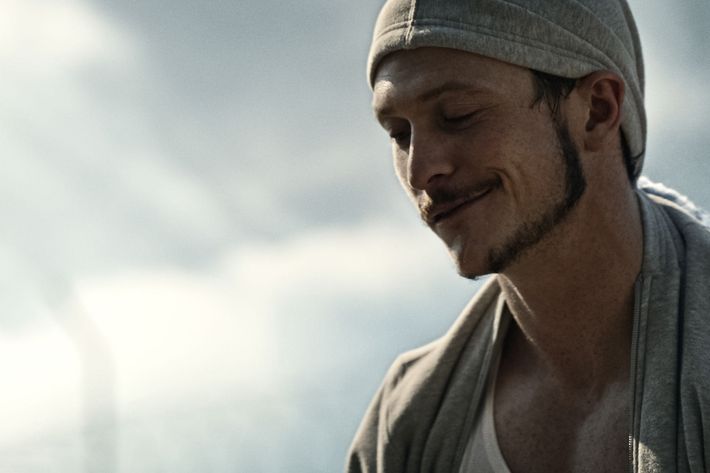
Once you start looking for them, you’ll realize that most of the people Shadow encounters on his travels are actually ancient gods. His friend in prison, played by Jonathan Tucker, goes by the not-so-subtle homonym Low Key Lyesmith. In prison, Lyesmith is preoccupied by the lack of hangings in America — “no gallows dirt, no gallows deals.” This doesn’t make much sense to Shadow, but it makes more sense if you consider the fact that Low Key Lyesmith is really Loki, the famously deceitful Norse trickster god with an affinity for fire and chaos. He’s Odin’s blood brother, or former blood brother, depending on which legend you look at it, but in either case their blood bond has been strained at times, to say the least. And Odin is the gallows god, after all: He once sacrificed himself by swinging from a noose tied to a branch of Yggdrasil, the great ash tree of Norse legend which sneaks into Shadow’s dreams. In exchange for nine days and nights in the noose, Odin received some of the greatest secrets of existence. Perhaps Low Key Lyesmith is hoping such a gallows deal will be in the cards once again.
Buffalo Man
Voiced by: Ian McShane
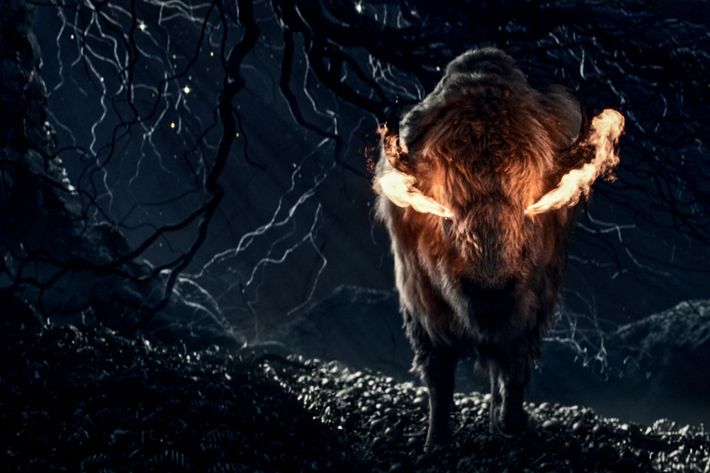
In addition to the great ash tree Yggdrasil, a talking buffalo with flames spurting out of his eyes also makes an appearance in Shadow’s dreams. The Buffalo isn’t a god, exactly. He’s the land — or so he tells Shadow toward the end of the book. But he’s god enough to need the same thing all the rest of Gaiman’s eternal beings need: faith. Fittingly enough, he has just one piece of advice for the dreaming Shadow: believe.
God name: Buile Suibhne
Character name: Mad Sweeney
Played by: Pablo Schreiber
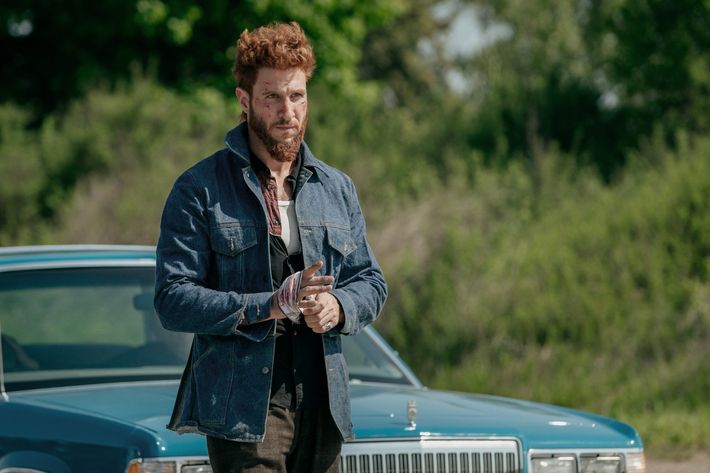
We meet others who seem to be paying close attention to any deals Mr. Wednesday might make. At the bar where Shadow agrees to work for Mr. Wednesday, an angry Irishman asks Shadow if he knows what Mr. Wednesday is really up to. “How much has our man told you?” he whispers in Shadow’s ear. This is Mad Sweeney, and he’s invested in the answer because he’s a leprechaun, as he tells Shadow frankly, and in this world, all the old gods care about what Odin, the all-father, is up to. (Sweeney’s name also hints that he is a version of the cursed Irish hero Suibhn, which translates to Sweeney, who went mad after losing the battle of Mag Rath in 637 C.E.) Shadow seems to be unsure of what to make of him. When Sweeney asks Shadow if he knows who Mr. Wednesday “really is,” Shadow doesn’t answer. When Sweeney demonstrates an iconic trick associated with his kind, snatching gold coins out of thin air, Shadow looks disturbed and demands to know how he does it. Sweeney offers to fight him for it — despite a little initial resistance, Shadow agrees and ends up with one of the magical golden coins, which he’ll go on to lay on his dead wife’s grave.
God name: None
Character name: Technical Boy
Played by: Bruce Langley

Throughout the first episode, Shadow remains mostly ignorant of the uncanny forces operating in his midst. His wife has recently died in a horrible accident, and all he wants is to go her funeral and bid her farewell. It’s there, however, where the theological issues become so pronounced that even he is starting to get the gist of what is going on. In the graveyard, he encounters a sparkly mechanical orb in a graveyard. Once the orb pounces onto his face, Shadow finds himself sitting in a stretch limo opposite the tech bro with the tendency to dissolve into pixels. (He also uses way too much hair gel.) “We’ve reprogrammed reality,” the tech bro says, through a cloud of the synthetic toad skins he says he’s been smoking. “Language is a virus, religion an operating system, prayers are just so much fucking spam.”
Shadow has been in prison. He’s seen things. But even he is a little nonplussed. “You’re saying all this like I’m supposed to know what the fuck you’re talking about,” he says.
What he’s talking about is war, or a kind of war, anyway. He’s one of the new American gods — Technical Boy is his name — and he wants to delete Shadow, Mr. Wednesday, and every other ancient being wandering around America, sucking up whatever small share of belief they can muster. (In the book, which came out in 2001, Technical Boy was depicted as a fat kid wearing a trench coat and drinking a Diet Coke, a Matrix fanboy. But times change, and the gods change with them.) Just as old gods whither away when people forget them, new gods materialize when new passions arise. Therein lies the tension. As Technical Boy puts it in the novel, “There’s only so much belief to go around. They’re reaching the end of all they can give us.”
God name: Anansi
Character name: Mr. Nancy
Played by: Orlando Jones
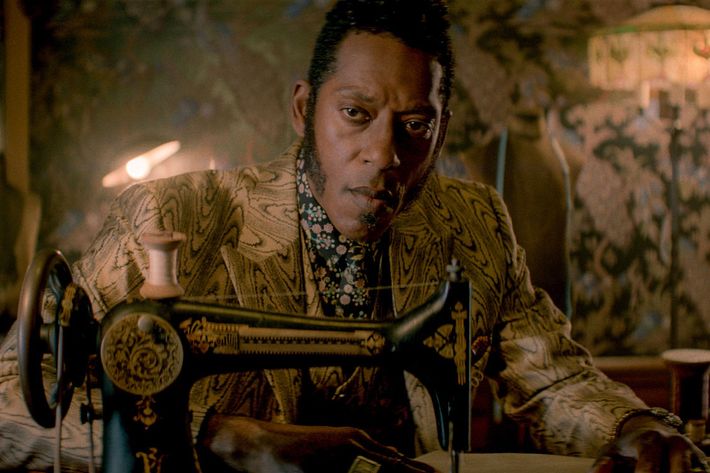
In the opening of the second episode, we get to see another Coming to America story out of Ibis’s leather tome. Anansi is a trickster folk hero who originated with the Ashanti people, from what is now Ghana. He’s often depicted as a spider; here, in 1697, crossing the Atlantic in the belly of a slave ship, he’s dressed in a loud plaid suit and depicted as a messenger from the future. He’s the god of all stories, and he’s got an important tale to tell this group of men: “Once upon a time, a man got fucked,” he begins.“That’s the story of black people in America.” He then launches into a rousing speech that would slip well into a Tarantino movie. Anansi urges them to riot: “There isn’t one goddamn reason you shouldn’t go up there right now and slit the throats of every last one of these Dutch motherfuckers and set fire to this ship.”
When one of the men protests that if they burn the ship, they will all die too, Anansi isn’t fazed. Like his friend Mr. Wednesday, Mr. Nancy doesn’t seem to mind a human sacrifice when the opportunity arises.
God name: None
Character name: Media
Played by: Gillian Anderson
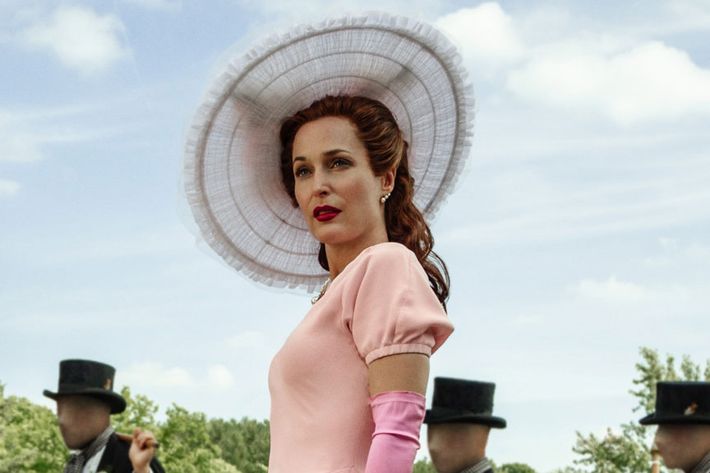
While gathering supplies for his road trip with Mr. Wednesday in some vast, nameless superstore, Shadow is stunned to notice that Lucy Ricardo from I Love Lucy is talking to him from one of the wide-screen TVs stacked in the electronics section. Like Technical Boy, Media is one of the new gods, and there’s no doubt that she’s been doing well for herself in the struggle for belief. Every time we binge a new TV show — or watch a movie, or read a TV recap, or just stare at the news on our phones in quiet desperation, she grows stronger. “Time and attention,” she explains to Shadow with a wink. “Better than lamb’s blood.”
Fittingly, she makes a better — or at least, prettier — case than Technical Boy about why Shadow should side with the new gods. Instead of intimidation and pyrotechnics, she offers what seems like a fairly reasonable argument about how her side is clearly positioned to win the coming war. “Look at it like this Shadow: We’re the coming thing. We are already here. We are self-driving cars and 3-D printers,” she tells him. “And your old boss is still selling oranges on the side of the road — not even organic.”
God name: Czernobog
Character name: Czernobog
Played by: Peter Stormare
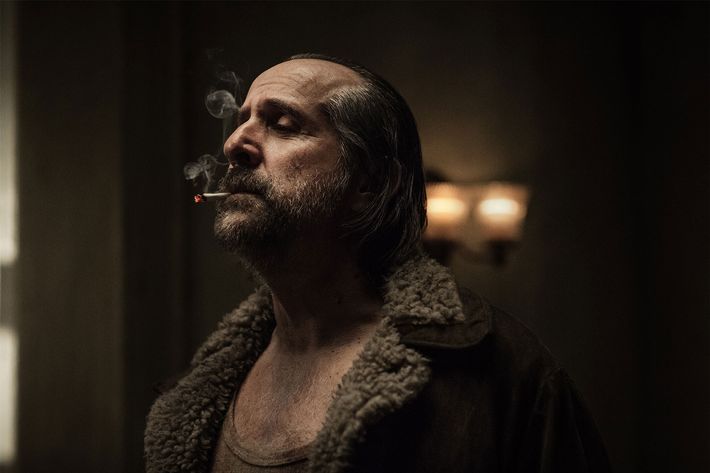
The first stop on Shadow and Mr. Wednesday’s road trip is Chicago, where they encounter Czernobog, the personification of all evil in Slavic society. Like a Slavic Thor, he also does his work with a hammer. These days, he’s getting by on a job in a slaughter house. He shows up in a filthy tank top and throws a lamp at Mr. Wednesday’s head by way of a greeting. Over dinner, he mourns the use of modern technology in his place of employment. “Now every monkey with a thumb can kill,” he says. After dinner, he shows Shadow his hammer and asks him to make a wager over a game of checkers. If he loses, he says, he’ll join them and try to persuade the other Old Gods to fight in Mr. Wednesday’s war. And if Shadow loses? Czernobog will take his hammer to Shadow’s forehead and kill him with one swift swing.
God name: The Evening Star
Character name: Zorya Vechernyaya
Played by: Cloris Leachman
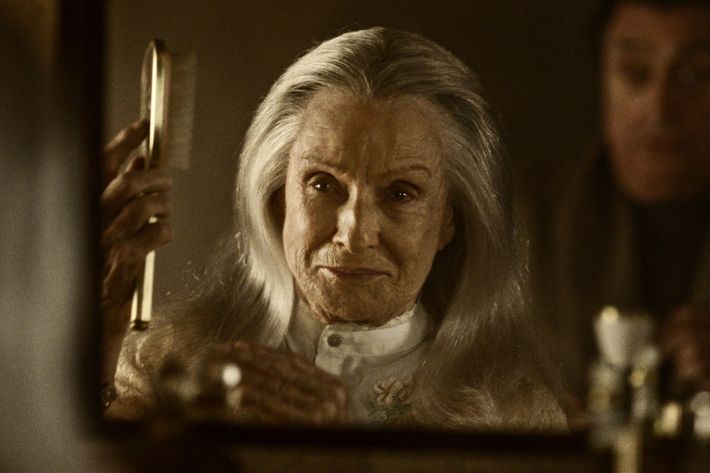
Czernobog lives with the Zorya sisters of Slavic legend, the daughters of the sun god.
Each night, Zorya Vechernyaya closes the gates once her father, the sun god, returns home on his chariot. “We came over together,” she explains to Shadow, of her living arrangements with the disagreeable Czernobog. Zorya Vechernyaya was born at dusk. She is the only one of the three sisters who can earn money telling fortunes, because, as Mr. Wednesday puts it, “she tells the best lies.” Before dinner, she offers to demonstrate her talent by reading the dregs in Shadow’s coffee. A look of horror crosses her face as she studies the grounds, but she recovers quickly. “You will have a long life, and a happy one,” she tells him.
God name: The Morning Star
Character name: Zorya Utrennyaya
Played By: Martha Kelly
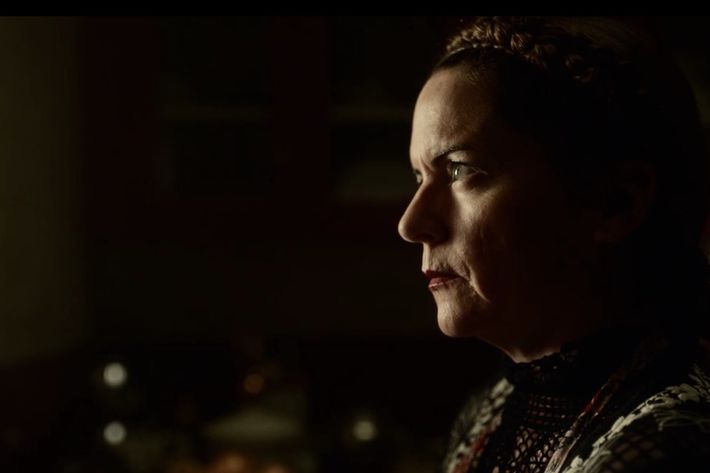
Zorya Utrennyaya doesn’t speak in the episode, but she does seem to appreciate Mr. Wednesday’s gift of a stack of romance novels. In Gaiman’s book, she’s the oldest sister, born at dawn. According to legend, Zorya Utrennyaya must open the gates for her father, the sun, every morning. She is also said to protect warriors in battle and save them from death.
There is a third sister, but we don’t get to meet her yet — she’s still sleeping. The sisters are rarely, if ever, all awake at once, since they also are responsible for constant surveillance of the night sky and ensuring that the doomsday hound Simargl, chained to the constellation Ursa Major, does not escape his bonds.
God name: The Midnight Star
Character name: Zorya Polunochnaya
Played by: Erika Kaar
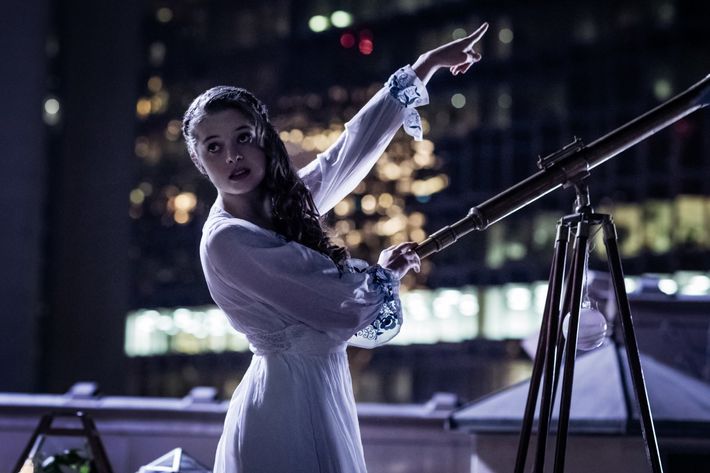
The youngest Zorya sister, the midnight star, is actually a creation of Gaiman’s imagination. When Gaiman was researching the book, he looked at the myths of the morning star and the evening star and thought to himself, as he explained in a 2011 interview with Patton Oswalt, “You know, it would be even cooler if there was a third.” She’s named after an Iggy Pop song — Sister Midnight.
God name: Anubis
Character name: Jacquel
Played by: Chris Obi
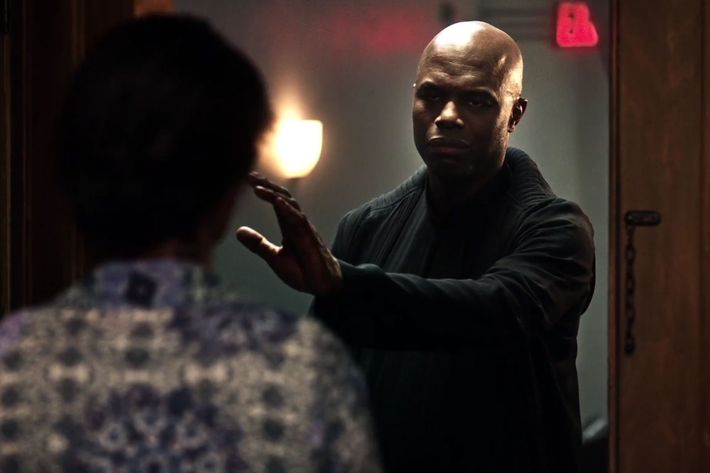
In the opening story of episode three, we meet Ibis’s partner at the funeral parlor, Mr. Jacquel, an equally dapper gentleman who likewise hails from the Egyptian pantheon. Jacquel is a version of Anubis, the god of the afterlife, and his name is a reference to the fact that Anubis occasionally appears in the form of a jackal. In addition to his earthly work preparing bodies for burial at the funeral parlor, Jacquel shows up to lead dead believers up into the vast desert realm of the dead.
Anubis is known as the “Guardian of the Scales.” Once he leads people into the mystical desert, he plucks out their hearts and weighs the evil in them. If their evil deeds are heavier than a feather then Anubis gives their heart to Ammit — an Egyptian demon whose body is part lion, part hippopotamus, and part crocodile — to be devoured.
God name: The Jinn
Character name: Ibrahim bin Irem
Played by: Mousa Kraish
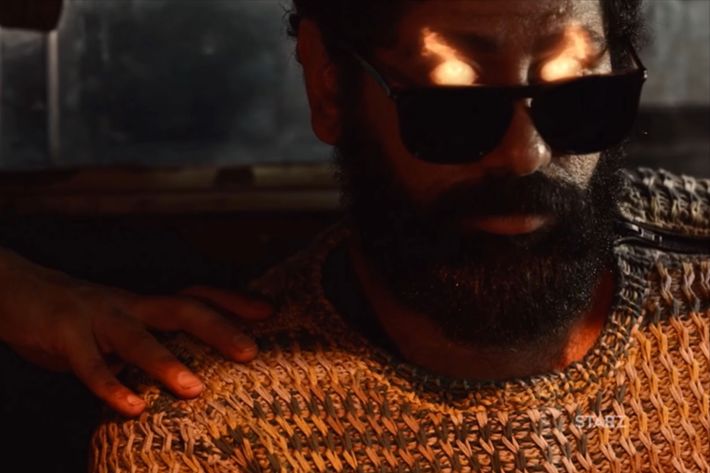
When a downtrodden salesman named Salim begins complaining to his cab driver about how much he hates his life and his work, the driver, who turns out to be a type of Arabian jinn known as an ifrit, can really commiserate. Back in the old country, where people believed in him, he didn’t have to drive cabs to make a living. Ifrits were thought to be enormous winged creatures made of fire, but this one has confined the flame to his eyes, where little blazes are concealed by thick sunglasses.
This jinn, unlike Aladdin’s famous genie, doesn’t grant wishes. And yet, in a way, he does fulfill the desires that Salim feels but cannot express. In a sex scene that is quite literally hot, he lifts away Salim’s loneliness, and in the morning, he provides him with an escape from the life he hated. The jinn is gone, but he’s left behind his clothing, his driver’s license, his cab; in exchange, he’s taken Salim’s suit and briefcase. They’ve both been granted a fresh start.
God name: Nunyunnini
Character name: None
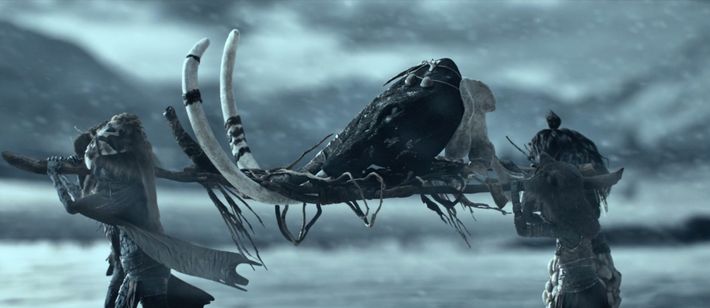
Episode five opens with another of Ibis’s “coming to America” tales. This one features a tribe that arrived in America in 14,000 B.C. Like all the other travelers to America over the centuries, they brought their god with them, in this case literally dragging a sacred woolly mammoth skull all the way across the land bridge from Siberia. The god was called Nunyunnini, and the tribe prayed to him to release them from the cold embrace of starvation. It’s possible that Gaiman conceived Nunyunnini as an earlier incarnation of Nun’Yunu’Wi, a monster from Cherokee mythology whose skin was hard as stone. But it’s difficult to say — the only thing we know for sure about Nunyunnini is that the people who once worshipped him died, and the god was entirely forgotten.
God name: None
Character name: Mr. World
Played by: Crispin Glover
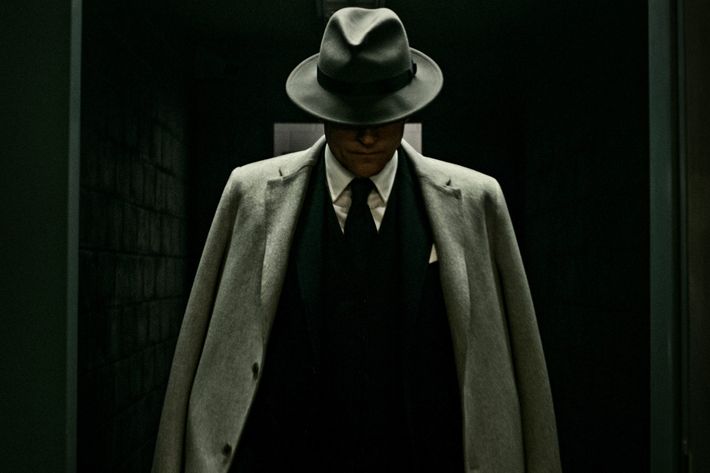
Remember that bank job Mr. Wednesday was so confident he and Shadow would get away with? It turns out Mr. Wednesday failed to consider the possibility that his nemesis, Mr. World, could easily pull up the evidence to put them away. Like Media and Technical Boy, Mr. World’s power is new — he seems to be the godly embodiment, at least in part, of the modern surveillance state. He has a “world’s eye view,” as Mr. Wednesday puts it, and he’s capable of obtaining information even the NSA might be hard-pressed to acquire, such as photographs of Shadow and Mr. Wednesday’s bank caper that should not have existed, and the number of Shadow’s mother’s sexual partners.
As the leader of the new gods, he has a proposition for Mr. Wednesday. Instead of a war with the newcomers, how would Mr. Wednesday like to have his name emblazoned on the missile that will wipe out North Korea? Mr. Wednesday doesn’t seem interested, but from a godly perspective, it might not be the worst deal in the world — at least people would once again know his name. As Nunyunnini learned, the worst possible thing for a god is to be forgotten.
God name: Vulcan
Character name: None
Played by: Corbin Bernsen
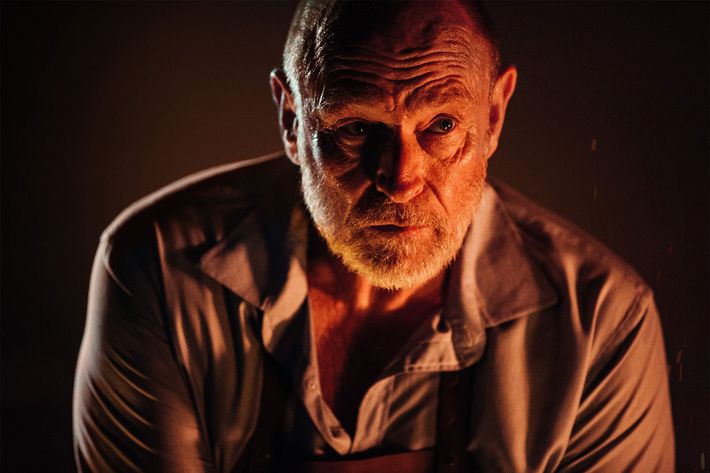
Vulcan, the ancient Roman god of fire and the forge, is the first god we’ve encountered who never appeared in the book. Gaiman created the character specifically for the TV show after a visit to a small steel town, where he saw a statue of Vulcan and heard a disturbing story about a series of fatal accidents at the local factory.
According to legend, Vulcan was known for creating weapons for the gods. Don’t worry if you’re not familiar — as he admits in episode six, “I was a story people forgot to remember to tell.” These days, though, he’s doing well. It seems he may have struck a deal with Mr. World. Instead of a missile, Vulcan’s name is emblazoned on bullets, and every act of gun violence is committed in his name — along with every fatal accident at the local bullet manufacturer. He’s the first of the old gods we’ve met who’s not hard up for prayer, and it’ll be interesting to see what happens to all that belief after Mr. Wednesday uses the sword Vulcan forged to chop off the fire god’s head.
God name: Ēostre
Character name: Easter
Played by: Kristin Chenoweth
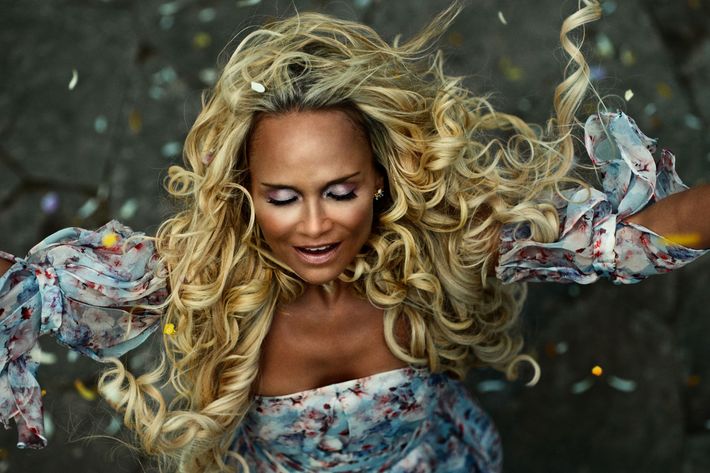
The last stop on Mr. Wednesday and Shadow’s season-one road trip takes place on Easter Sunday, at a charming country estate in Kentucky. The hostess is fond of bunnies and pastel shades, but she isn’t the goddess of Easter — not exactly, anyway. She is Ēostre, the goddess of the spring and the dawn; she brings renewal and growth. She also, according to some legends, can resurrect the dead.
Ēostre is an ancient Germanic goddess who’s been saved from oblivion by associating herself with the Christian holiday — which perhaps explains why the majority of guests at her Easter brunch are different versions of Jesus. It seems that at some point over the past several hundred years, Ēostre, like Vulcan, made a deal with the new gods to stay relevant as belief in the ancient gods faded away. As Media puts it: “It’s religious Darwinism: adapt and survive.”


